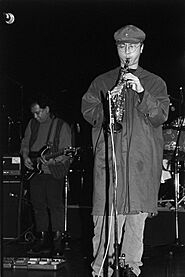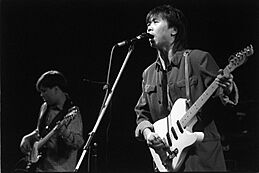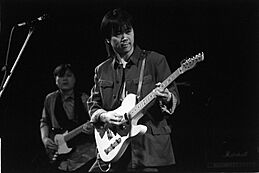Cui Jian facts for kids
Quick facts for kids
Cui Jian
|
|||||||||
|---|---|---|---|---|---|---|---|---|---|
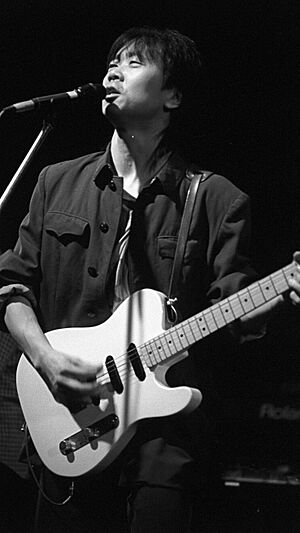
Cui in 1993
|
|||||||||
| Born | 2 August 1961 Beijing, China
|
||||||||
| Occupation |
|
||||||||
| Years active | 1984–present | ||||||||
| Height | 172 cm (5 ft 8 in) | ||||||||
| Children | 1 | ||||||||
| Awards | Full list | ||||||||
| Musical career | |||||||||
| Also known as | Old Cui (老崔; Lǎo Cuī) | ||||||||
| Origin | China | ||||||||
| Genres | |||||||||
| Instruments |
|
||||||||
| Labels |
|
||||||||
| Chinese name | |||||||||
| Chinese | 崔健 | ||||||||
|
|||||||||
| Chinese Korean name | |||||||||
| Chosŏn'gŭl | 최건 | ||||||||
|
|||||||||
Cui Jian (born August 2, 1961) is a famous Chinese singer, songwriter, and musician. He is often called the "Godfather of Chinese Rock" because he is one of the most important rock musicians in China's history.
Cui is known for his unique style. He mixes rock music with Chinese traditional music, hip-hop, and jazz. His songs often have deep lyrics about society and life. He is seen as a cultural hero whose music helped shape rock music in China and across Asia.
Cui was born in Beijing to a family of artists. He started his music career in 1981. In 1986, he performed his song "Nothing to My Name". This performance is seen as a major moment for Chinese rock music. At the time, most music in China was either patriotic or pop. Cui's rock music was new and exciting, and he became very popular with university students.
His first rock album, Rock 'n' Roll on the New Long March (1989), was a huge success. It is still one of the best-selling albums in China. For a time, the government did not allow him to perform in large venues. This was partly because he supported the 1989 Tiananmen Square protests. These rules were later lifted.
Cui has sold over 12 million records. He has performed in more than 1,000 concerts all over the world. In 2022, he won the Golden Melody Award for Best Male Mandarin Singer, a top award for Chinese-language music.
Contents
Early Life and Musical Beginnings
Cui Jian was born into an ethnic Korean family in Beijing. His father was a professional trumpet player, and his mother was a dancer. Because his parents were often busy with work, he spent much of his childhood in a boarding kindergarten.
When he was 14, Cui's father taught him to play the trumpet. In 1981, he joined the Beijing Symphony Orchestra. During this time, he started listening to rock and roll music from other countries. He heard artists like the Beatles and the Rolling Stones on cassette tapes that his friends brought back from places like Hong Kong.
He taught himself to play the guitar and began writing his own songs. In the early 1980s, playing the guitar was sometimes seen as rebellious. But when Cui played for an audience, they were amazed. In 1983, he wrote his first song, "I Love My Guitar."
Career
First Bands and Early Songs
In 1984, Cui Jian formed his first band, the Seven-Player Band. They were one of the first bands in China to play their own rock music in local hotels and bars. They were inspired by bands like The Beatles. The band released a cassette called Returning Wanderer that same year.
After the band broke up in 1985, Cui wrote his first rock song, "It's Not That I Don't Understand." This song is considered one of the first rap rock songs in China. It mixed hip-hop sounds with traditional Chinese instruments like the dizi, a type of flute.
The Rise of "Nothing to My Name"
In 1986, Cui performed his song "Nothing to My Name" at a major concert in Beijing's Workers' Gymnasium. He came on stage wearing an old-fashioned coat and sang with a powerful, rough voice. The audience, used to polite pop singers, was stunned at first. Then, they began to cheer wildly.
This performance is often called the birth of Chinese rock and roll. The song became an anthem for young people in China. It was about feeling lost and wanting to find your own identity. The song used the word "I" many times, which was different from older songs that usually used "we." This was a call for people to express themselves as individuals.
The song became a huge hit. Young fans started dressing like Cui, with long hair and jeans. A fan club for him was even started at Peking University.
Major Albums and Tours
In 1989, Cui released his first full rock album, Rock 'N' Roll on the New Long March. It was the first album in China to be recorded with electric guitars and drums. The album was a massive success and is considered a classic of Chinese rock.
That same year, student protests took place in Tiananmen Square. "Nothing to My Name" became a song of hope for the protesters. Cui even performed for the students in the square. After the government ended the protests, Cui was not allowed to perform in large concerts in Beijing for many years.
Despite this, he continued to make music. In 1990, he went on a tour across China to raise money for the 1990 Asian Games. The tour was very popular but was stopped by officials before it could finish.
Exploring New Sounds
In 1991, Cui released the album Solution. It had a faster, rougher sound with more distorted guitars. His next album, Balls Under the Red Flag (1994), mixed rock with jazz and rap. At first, many people didn't like this new style, but today it is considered one of his best works.
Throughout the 1990s, Cui toured internationally, performing in Japan, Germany, and the United States. He was the first mainland Chinese singer to have his own concert tour in the U.S.
In 1998, he released The Power of the Powerless, which explored electronic rock. He used computers and samplers to create new sounds, showing he was always willing to experiment.
Fighting for Live Music
Cui has always believed that music should be performed live. He was a strong critic of singers who lip sync (pretend to sing) at their concerts. In 2002, he started the "Live Vocals Movement" to encourage real, live performances. Many musicians joined him, and the movement helped change the music industry in China.
In 2005, Cui was finally allowed to hold a large concert in Beijing again. He performed at the Capital Indoor Stadium to a sold-out crowd. That same year, he released the album Show You Colour, which mixed many different styles like pop, rock, and hip-hop.
Working in Film and Other Projects
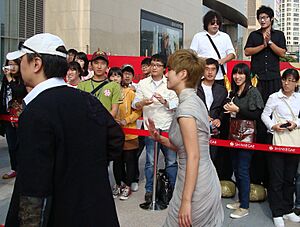
Besides music, Cui has also worked in movies. He acted in the 1993 film Beijing Bastards and directed his own film, Blue Sky Bones, which was released in 2014. The film won awards at several international film festivals.
He has also been involved in charity work. After the 2008 Sichuan earthquake, he organized a concert to raise money for disaster relief. He is also an ambassador for Earth Hour, an event that promotes environmental awareness.
Recent Years and "A Flying Dog"
In 2015, Cui released the album Frozen Light. He continued to tour and perform, including a special 30th-anniversary concert in 2016.
His 2021 album, A Flying Dog, was a major success. It earned him the award for Best Mandarin Male Singer at the 33rd Golden Melody Awards in 2022. This was a huge honor, as he was the first mainland Chinese musician to win it.
In April 2022, an online concert by Cui attracted 46 million viewers, showing that he is still incredibly popular. He continues to tour and create new music.
Musical Style and Themes

Cui Jian is known for mixing many different styles of music. He combines rock with traditional Chinese folk music, jazz, funk, and hip-hop. He was one of the first artists in China to use rapping in his songs. He also uses traditional Chinese instruments like the guzheng (a plucked string instrument) and the suona (a loud horn).
His lyrics are famous for being like poetry. They often talk about big ideas like freedom, identity, and the challenges of modern life in China. He uses powerful images and metaphors to express his feelings. For example, he often uses the color red and other symbols from China's history in a new and personal way.
Cui's singing voice is very distinctive. It is often described as raw, hoarse, and passionate. This unique style makes his music instantly recognizable.
Legacy and Influence
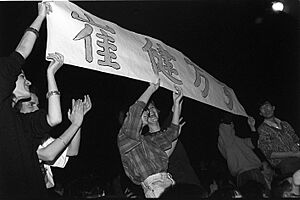
Cui Jian is a true cultural icon in China. He is credited with bringing rock and roll to the country and inspiring a whole generation of musicians and fans. His music gave a voice to young people who felt that mainstream culture did not represent them.
He is often compared to Western music legends like Bob Dylan and Bruce Springsteen because of his powerful lyrics and rebellious spirit. Many artists, both in China and other parts of Asia, have been influenced by his music.
Even today, Cui Jian is seen as a symbol of artistic freedom and integrity. He has always stayed true to his own vision, never afraid to experiment with new sounds or speak his mind. His work has left a lasting mark on Chinese music and culture.
Discography
- Returning Wanderer (1984)
- Rock 'n' Roll on the New Long March (1989)
- Solution (1991)
- Balls Under the Red Flag (1994)
- The Power of the Powerless (1998)
- Show You Colour (2005)
- Frozen Light (2015)
- A Flying Dog (2021)
Images for kids
See also
 In Spanish: Cui Jian para niños
In Spanish: Cui Jian para niños


